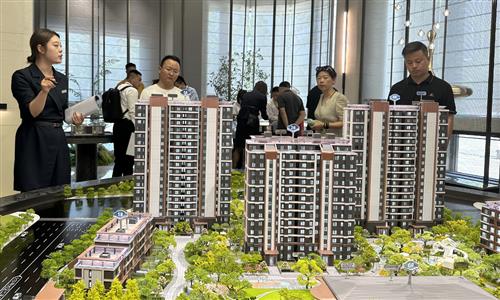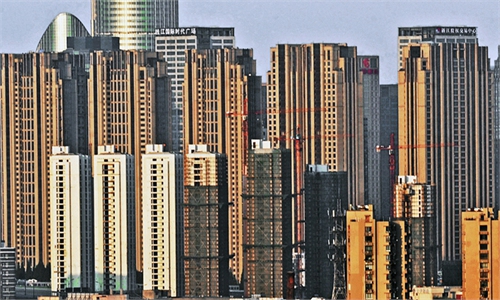
Illustration: Chen Xia/Global Times
To breathe new life into a lackluster real estate sector suffering a post-pandemic hangover so that it could again help fire up domestic consumption and overall economic growth is of great importance for China. Giving a glance across the world's major economies, developed or emerging, a healthy and dynamic property market remains a prerequisite leading to sustainable GDP growth.At the current stage, it is necessary and also warranted to remove the hurdles previously placed to slow down a "flamboyantly fiery" property sector across the country.
Major Chinese cities including Nanjing, Qingdao, Hefei, Shenyang, Jinan, Lanzhou, Zhengzhou, Dongguan and Dalian have recently moved to eliminate administrative curbs on home buying, reflecting both central and regional governments' determination to resolve the problems faced by the country's massive real estate sector that has weighed on the economy since 2020 in the aftermath of the pandemic outbreak.
Other cities are most likely to follow suit in easing up restrictions on real estate, as Suzhou, a megacity of more than 12 million in Jiangsu Province, said that home buyers are now free to purchase apartments of 120 square meters or more. And, the southern metropolis Guangzhou, with over 18 million residents, has abandoned a controversial seven-year policy limiting home sale prices, which was previously deemed to suppress skyrocketing property prices.
These cities' scrapping strict curbs on home purchase and sale sends a clear signal that the policymakers intend to open the door wider for property policy easing, to go in tandem with the central government's overall economic growth-reinforcing package, in an attempt to stimulate property transactions and significantly improve market expectations, which has been subdued in the first half of this year.
On Friday, the National Bureau of Statistics revealed that property investment fell 8.8 percent in the first eight months, while property sales by floor space dropped 7.1 percent in the same period, compared to the corresponding time last year.
From the perspective of inner and outer functions, China's real estate sector still has significant room to grow. The country's urbanization rate, now at around 65 percent, is lower than the US' 80 percent, France's 81 percent, and Japan's 92 percent, so more rural residents are expected to continue to move and settle in Chinese cities. Also, China's central bank has lately kept a very loose monetary policy, with the benchmark loan prime rate (LPR) set at near-record lows, which should buoy up the construction industry.
Chinese economists have said that the optimization of government policies targeting real estate remains crucial to stimulating one of the most significant segments of the economy. Wary of the 2008 US subprime-induced financial system crisis reappearing in China, the policymakers are righteous to take the initiative in 2017 to tighten bank loans going to debt-fuelled developers. As a result, the market exuberance for frenzied home buying and property hoarding was quickly watered down.
By all metrics, the financial policy tightening targeting the real estate sector was needed to stop overheated property speculation as housing bubbles were unhealthy for the economy. The sector encountered a wave of downward slide in the past three years when the authorities took steps to stop developers from accumulating unmanageable debt.
Nevertheless, the cut-off of bank loans and other financing channels dealt a heavy blow to the developers, which indirectly impacted property market sentiment.
A nationwide property market slump is never in the interest of a country's economy, for it will dampen the public's confidence and restrain people's appetite for shopping big-ticket items like cars and household appliances, because the average households feel their net worth associated with their properties is being reduced.
The huge property industry has been long an important engine of China's economic growth, and investors see the revival of the sector as crucial to the recovery of the world's second largest economy. However, the default of major developers like Evergrande Group has dented investor confidence in the sector.
In recent weeks, China's central government has rolled out a series of measures, including easing borrowing limits and cutting borrowing costs to extend a helping hand to the developers and vast home buyers as well.
As a result, the tier-one metropolises like Beijing, Shanghai and Shenzhen have all witnessed a marked increase in home sales lately. For instance, new home sales in Beijing and Shanghai jumped last week, keeping property showrooms open late into the night to meet customer demand, in a clear sign that the government efforts to revive the sector are starting to yield some tangible results.
All these positive changes in the industry follows a policy pivot by a key meeting of the Political Bureau of the Communist Party of China (CPC) Central Committee in late July to adjust and optimize the country's property policies in a timely manner in order to engineer a gradual but steady recovery of the sector.
Earlier, Ni Hong, Minister of Housing and Urban-rural Development, said in a meeting with representatives of Chinese developers that more easing measures for the property sector will be implemented, such as reducing mortgage rates and cutting down-payment ratios. Housing authorities in all major cities have pledged support for the housing market, reflecting the leadership's intent to further ease property control measures, which sent shares of the developers surging upwards earlier this month.
Starting in September, officials have moved to reduce interest rates on existing first-home mortgage loans. All these measures are aimed at revitalizing property sector activity and accelerating housing sector's rapid recovery, in addition to boosting market confidence. The overall effect of the measures will need some time to be gauged.
The country's tier-one and tier-two megacities have been called on to "satisfy the rigid demand and improvement demand for housing" and facilitate a healthy development of their respective property markets. The latest streams of incremental positive news are meaningful and should be able to give a shot in the arm to the real estate sector. Next year, China's real estate market is likely to witness a marked improvement with considerably higher home sales and reviving property prices.
The author is an editor with the Global Times. bizopinion@globaltimes.com.cn


